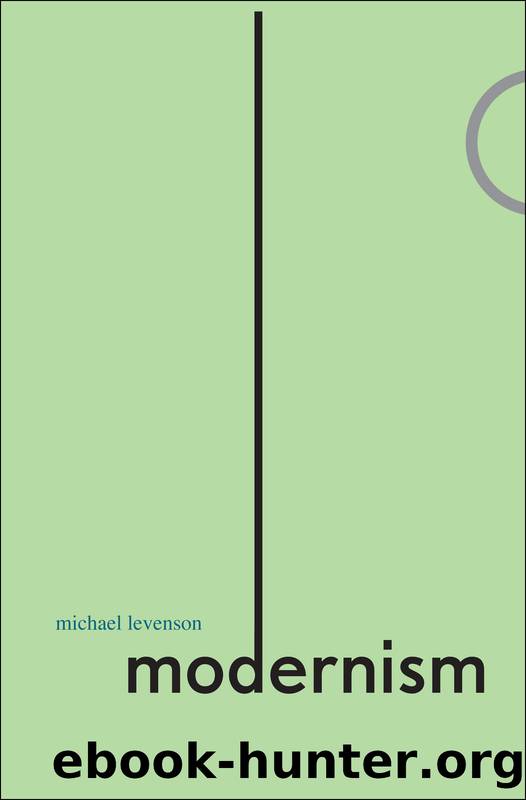Modernism by Michael Levenson

Author:Michael Levenson
Language: eng
Format: epub
Publisher: Yale University Press
Published: 2011-11-15T00:00:00+00:00
WORDS AT LIBERTY: MARINETTI, LOY, STRAMM, AND DADA
In the years just before the war, lyric poets across much of Europe pursued the most extreme forms of aesthetic radicalism. âFree verseâ (vers libre) appeared among the French symbolists at the end of the nineteenth century, but the liberation of rhythm was only a first stage of experiment. Futurist poetry began under the inspiration of vers libre; by 1914, Marinetti aimed to extend the freedom of verse to the freedom of individual words. A manifesto of 1914ââDistruzione della sintassi. Immaginazione senza fili. PAROLE IN LIBERTÃâ (Destruction of the Syntax. Wireless Imagination. Words in Freedom)âproclaimed the new dispensation.
With words in freedom we shall have: CONDENSED METAPHORâMAXIMUM VIBRATIONâNODES OF THOUGHTSâCLOSED OR OPEN FANS OF MOVEMENTâSHORTCUTS OF ANALOGIESâBALANCE OF COLOURSâDIMENSIONS, WEIGHT AND SPEED OF SENSATIONSâTHE PLUNGE OF THE ESSENTIAL WORD INTO THE WATER OF SENSIBILITY WITHOUT CONCENTRIC CIRCLES PRODUCED BY ITâREPOSE OF INTUITIONâMOVEMENTS IN TWO, THREE, FOUR, FIVE BEATSâANALYTIC MEANS OF EXPLICATION THAT SUSTAIN THE BUNDLE OF THE INTUITIVE WIRES.90
Beneath the uppercase declamation, the central thought was that poetry was still bound in the snares of syntax. Why should the sentence have supremacy? Why should the structure of grammar claim authority? The âTechnical Manifesto of Futurist Literatureâ (1912) had held that âone must destroy syntax and scatter oneâs nouns at random, just as they are bornâ and âone must abolish the adverb, old belt buckle that holds two words together.â91 Here is a translation of Marinettiâs poem âBombardamentoâ (Bombardment).
cattle prods carts pluff plaff rearing
of horses flic flac zing zing shiaaak
hilarious neighing eeeeeee ⦠shuffling of feet clinking 3
Bulgarian battalions marching croooc-craac
(SLOW TWO TEMPI) Shumi Maritza
of Karvarena croooc craaac shouting of
officers slamming like brass plates
pan here paack there ching buuum
cing ciak [PRESTO] ciaciaciaciaciaak
up down here there around up high watch out
above the head chiaak beautiful Flames92
Part of Marinettiâs campaign was linguistic, inspired by a view widely shared in his generation: the sense that language was cluttered, that sentences were bloated with an excess of adjectives and adverbs, and that the rigidity of syntax discouraged speed and immediacy. To set nouns freeââcattle prods cartsââand then to allow other words, including nonsense syllables, to follow motions unconstrained by grammar became a concerted, uproarious assault.
In a similarly vehement polemic Marinetti emphasized a different poetic failure: the âIâ of the lyric speaker, another relic that futurist poetry would consign to the past. âDestroy the I in literature,â writes Marinetti, âthat is, all psychology. The man sidetracked by the library and the museum, subjected to a logic and wisdom of fear, is of absolutely no interest. We must therefore drive him from literature and put matter in his place.â In place of human psychology, which is exhausted, poetry can substitute the âlyric obsession with matter.â Nouns, set free from other parts of speech, will show the accelerating world beyond the âcold, distracted I, too preoccupied with itself, full of preconceived wisdom and human obsessions.â93 Subjectivity adds nothing to the spectacle of modernity.
Mina Loy made an oblique entrance into this scene of lyric radicalism.
Download
This site does not store any files on its server. We only index and link to content provided by other sites. Please contact the content providers to delete copyright contents if any and email us, we'll remove relevant links or contents immediately.
The Power of Myth by Joseph Campbell & Bill Moyers(1068)
Half Moon Bay by Jonathan Kellerman & Jesse Kellerman(987)
A Social History of the Media by Peter Burke & Peter Burke(985)
Inseparable by Emma Donoghue(983)
The Nets of Modernism: Henry James, Virginia Woolf, James Joyce, and Sigmund Freud by Maud Ellmann(913)
The Spike by Mark Humphries;(812)
The Complete Correspondence 1928-1940 by Theodor W. Adorno & Walter Benjamin(788)
A Theory of Narrative Drawing by Simon Grennan(781)
Culture by Terry Eagleton(776)
Ideology by Eagleton Terry;(742)
World Philology by(719)
Farnsworth's Classical English Rhetoric by Ward Farnsworth(715)
Game of Thrones and Philosophy by William Irwin(712)
Bodies from the Library 3 by Tony Medawar(709)
High Albania by M. Edith Durham(705)
Adam Smith by Jonathan Conlin(694)
A Reader’s Companion to J. D. Salinger’s The Catcher in the Rye by Peter Beidler(688)
Monkey King by Wu Cheng'en(653)
Comic Genius: Portraits of Funny People by(652)
